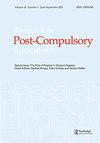Gender differences in work-life conflict during Covid? A research agenda for work-life conflict post-pandemic
IF 0.9
Q3 EDUCATION & EDUCATIONAL RESEARCH
引用次数: 0
Abstract
ABSTRACT Studies on gender differences in work-life conflict have shown that women often report higher levels of work-life conflict due to social mores of undertaking a larger proportion of childcare and household work. Similarly, emergent research on the impact of the Covid pandemic on work-life conflict have shown that women experienced more work-life conflict. During the pandemic, educational work and provision took place within the home. The current study therefore sought to investigate work-life conflict for employees in the further education sector during the pandemic. The findings of the current study suggest that there were no gender differences, at least in the case of the further education sector, which is contrary to extant research on work-life conflict. Thus, there is scope to explore through future research whether there is trajectory towards gender equalitarianism in the sharing of household work, whether the pandemic as a crisis was an episodic event that necessitated gender equalitarian work distribution, or whether the blurring of boundaries between work and non-work domains is a continuum of neoliberal institutional demands.Covid期间工作与生活冲突中的性别差异?大流行后工作与生活冲突的研究议程
摘要:关于工作与生活冲突中的性别差异的研究表明,由于承担更大比例的育儿和家务劳动的社会习俗,女性往往报告说工作与生活的冲突程度更高。同样,关于新冠肺炎疫情对工作与生活冲突影响的新研究表明,女性经历了更多的工作与生活的冲突。在疫情期间,教育工作和提供都是在家里进行的。因此,目前的研究试图调查疫情期间继续教育部门员工的工作与生活冲突。目前的研究结果表明,至少在继续教育部门没有性别差异,这与现有的关于工作与生活冲突的研究相反。因此,通过未来的研究,我们有空间探索在分担家务劳动方面是否存在性别平均主义的轨迹,作为一场危机的疫情是否是一个需要性别平等工作分配的偶发事件,或者工作和非工作领域之间界限的模糊是否是新自由主义制度需求的连续体。
本文章由计算机程序翻译,如有差异,请以英文原文为准。
求助全文
约1分钟内获得全文
求助全文
来源期刊

Research in Post-Compulsory Education
EDUCATION & EDUCATIONAL RESEARCH-
CiteScore
1.30
自引率
14.30%
发文量
31
期刊介绍:
Throughout the world, there is a growing awareness of the significance of vocational and post-compulsory education and training systems. The majority of countries are working hard to develop their provision, recognising the importance of post-compulsory education in providing educated and skilled people in sufficient numbers at appropriate levels to assist economic and social development. Research in Post-Compulsory Education, sponsored by the United Kingdom"s Further Education Research Association (FERA), recognises the need for more international research and analysis and the generation of relevant theory in order to identify policy needs and trends as well as priorities in this growing area.
 求助内容:
求助内容: 应助结果提醒方式:
应助结果提醒方式:


